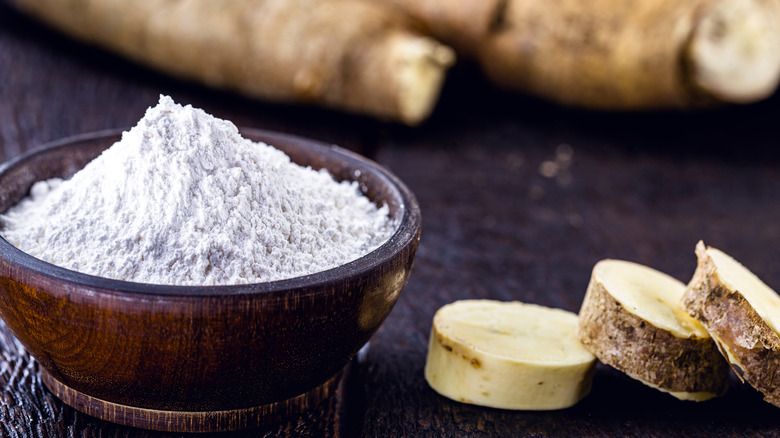What Is Cassava Flour?
If you're a gluten-free foodie or someone who loves experimenting with healthy ingredients, you may know your way around popular flour substitutes like almond and coconut flour. But what if you happen to have a nut allergy or hate the flavor of coconut? Fear not, you don't have to give up your favorite chocolate chip cookie recipe just yet.
Cassava flour is a popular alternative for allergen-sensitive cooking and baking. It has a fairly neutral, slightly nutty flavor profile, minimizing taste alterations to your favorite recipes (via Better Homes & Garden). But that's not the only reason to give cassava flour a whirl in your stand-up mixer. It also has a plethora of other benefits including higher nutritional content than white flour and a low sugar content (via Livestrong). Being allergen-friendly makes cassava flour a helpful alternative for people with food sensitivities like gluten intolerance, autoimmune disorders like Crohn's disease, and is generally safe for most other dietary restrictions. However, because cassava is high in carbohydrates, it may not be best for those following a low-carbohydrate or keto diet.
Cassava flour: origins and nutrition
Cassava, or yucca root, is a starchy root vegetable similar to the potato family. It's native to South America, grows in many parts of the world, and serves as a nutritional staple in various cultures (via World Atlas). Think cassava flour sounds exotic and thus hard to find? Think again. Because cassava flour has become popular in recent years, it's likely you'll find it at your local market.
In order for cassava flour to have made its way to our grocery store shelves, cassava was first peeled, grated, dried, and ground to a fine powder. Cassava flour contains about 5 grams of fiber per serving, is higher in essential minerals than white flour, and is a good source of vitamin C, thiamine, riboflavin, and niacin (via Medical News Today). Cassava flour can also support various diet directions, being that it's free of grains, gluten, and other common food allergens, according to WebMD.
Perhaps most fascinating is the beneficial impact it can have on our gut health. Medical News Today reports cassava flour boasts a resistant starch that helps feed our beneficial gut bacteria and reduces levels of inflammation inside the colon. For those with autoimmune disorders or bowel problems, this can be a game-changer.
Using cassava flour in cooking and baking
Generally speaking, cassava flour can be substituted 1:1 for regular all-purpose flour. However, cassava flour is known to be more absorbent than wheat flour. As such, Better Homes & Gardens suggests starting with a little less cassava flour than the amount of white flour called for in the recipe. Besides, it's always a good idea to test your ratios anytime you're substituting flour, and expect to make your recipe a couple of times to get it perfect.
If your batter feels too loose or too wet, you can always gradually add more. But you can't take it out once it's been added. Not only is cassava flour great for baking, but you can use it for cooking as well. Want to thicken a sauce to perfection or coat sweet potato fries before baking them crispy and light? Cassava flour can do the trick.



